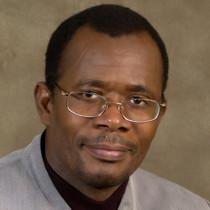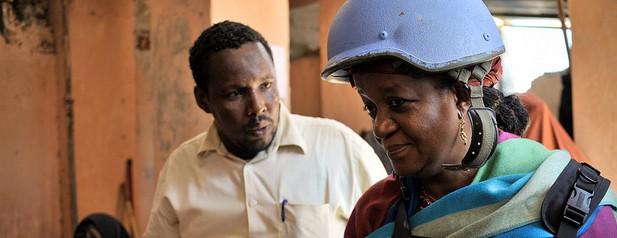Mauritania elections: Aziz victorious, but opposition primed for future confrontations – By Boubacar N’Diaye

 As he flew to Malabo, capital of Equatorial Guinea, to preside over an African Union summit on the fight against terrorism, President Mohamed Ould Abdel Aziz must have been feeling very good about himself. As president of an organisation that had vilified and attempted to marginalize him only a few short years ago, this would have felt like sweet revenge indeed.
As he flew to Malabo, capital of Equatorial Guinea, to preside over an African Union summit on the fight against terrorism, President Mohamed Ould Abdel Aziz must have been feeling very good about himself. As president of an organisation that had vilified and attempted to marginalize him only a few short years ago, this would have felt like sweet revenge indeed.
With a whopping score of nearly 82% in the country’s recent presidential election, Aziz’s re-election for a second mandate was the culmination of his single-minded determination to remain in power at all costs since his August 2008 coup d’état.
In a matter of weeks Aziz will also gleefully co-preside over the US-Africa summit at the White House with Barack Obama. Doubtless, this will be the highpoint in the career and political life of a man who, less than a decade ago, was an obscure and obsequious officer in the shadow of his mentor, Colonel Ould Taya, who ruled the country for 21 years.
However, behind what looks like a period of unmitigated success for Aziz, there is a more precarious political reality. In 2008 General Aziz’s coup plunged Mauritania into a severe political and societal crisis and the deeply flawed elections held in 2009 and 2014 have only served to heighten this.
The first post-coup elections in July 2009 were meant to help resolve the political crisis provoked by the coup, which had derailed a then promising democratisation process. The country’s political opposition participated as a part of the internationally brokered Dakar Agreement.
When the 2009 election was denounced by the opposition as fraudulent, General Aziz made a point of ignoring these grievances and other clauses of the Dakar accord, many of which were meant to create an appeased political environment to allow a genuine democratisation process to proceed.
After wearing down and further dividing the opposition, he sidelined even potential allies, leading to the boycott of the 2013 parliamentary and municipal elections by a significant portion of the opposition. This produced a National Assembly and municipalities dominated by Aziz’s party state, which does not genuinely reflect the country’s political landscape.
It also led to the growth of the Islamist political party Tawassoul – now a significant political force in the country – even as religion became more and more (dangerously) politicised, while traditional opposition parties became excluded from formal political institutions.
Aziz’s victory in last month’s presidential election was achieved in the context of an opposition boycott of the polls, citing the president’s refusal to ensure measures that would guarantee transparency and integrity in the electoral process. The withdrawal of major political parties, including Aziz’s former allies, occurred after a dialogue the government reluctantly conducted with the opposition only weeks before the election. In the absence of a consensus, Aziz’s government unilaterally controlled all aspects of the electoral process, making its outcome highly predictable.
Only four marginal candidates, with no illusions about the outcome of the process, participated. Aziz ignored them, preferring to aim his wrath at those who boycotted and urging a high turnout. While the official figure of a 56.5% cannot be independently verified, it appears rather high given the show of force the opposition displayed right before the polls. Participating candidates also denounced the return of old fashioned tactics of ballot box stuffing and other electoral malpractice that Mauritanians are all too familiar with.
Predictably, a more and more radicalised opposition has regrouped under the banner of the Forum National pour la Démocratie et l’Unité (FNDU) and reacted vehemently to the election calling it another electoral coup d’état, refusing to acknowledge its outcomes. Ominously, the opposition coalition concluded that “transfer of power through elections remains impossible under Mohamed Aziz’s rule which only dangerously opens the gates to all forms of instability.”
Aziz’s re-election was the latest episode in the ongoing battle of wills between the president and the political opposition. Assured of backing from the military, he has so far managed to win every skirmish and confrontation in this war of attrition which started with the 2008 coup.
Since he presided over the re-configuration of the ruling coalition made up of segments of the business class (now dominated by members of his tribe, the Oulad Bousbaa), the top brass of the officer corps (both active and in retirement), and a bureaucratic class, all from the politically dominant Arab-Berbers, Aziz seems to have had everything his own way.
But while his maneuvers succeeded in dividing and weakening the opposition, they have also radicalised it and attracted to it numerous independent personalities, including his own cousin and former head of state Ely Ould Mohamed Vall, and members of an increasingly active civil society. All the while, an impoverished strata of the population in urban centers, where workers have become more restive, wonder just where the dividends of the country’s much-touted economic growth have gone. Aziz can continue to ignore this political and social reality at his own peril.
Since he prevailed in his bid for power in 2008-09, Aziz has demonstrated that he learned a great deal from Ould Taya’s regime. This includes his unwillingness to compromise, his obvious contempt for the civilian political and intellectual classes and his determination to go it alone. As his new five-year term gets under way, Aziz’s worst enemy may very well be this (exaggerated) sense of omnipotence and contempt for the political opposition.
The next five years are likely to be fraught with dangers in a particularly volatile sub-regional environment. Furthermore, one of the most notable outcomes of this election has been the emphatic emergence and gains in respectability and audience of one of the candidates, Biram Ould Abeid, the champion of the H’ratin (former slaves) cause – a Malcolm X-like strident voice against slavery and racism in Mauritania who managed to garner the support of nearly 10% of voters.
After winning the UN Human Rights Prize last year, this success will make Biram an increasingly central actor in Mauritanian politics. His determination to force on to the agenda the causes he champions and his confrontational style are sure to make him and his movement major irritants to Aziz’s regime and remind all that Mauritania remains a politically and socially troubled land. Should he ally with the opposition for more direct action, the illusion of stability Aziz was able to sell for so long may be laid bare.
Boubacar N’Diaye is Associate Professor of Africana Studies and Political Science at The College of Wooster, Ohio, USA: [email protected]





